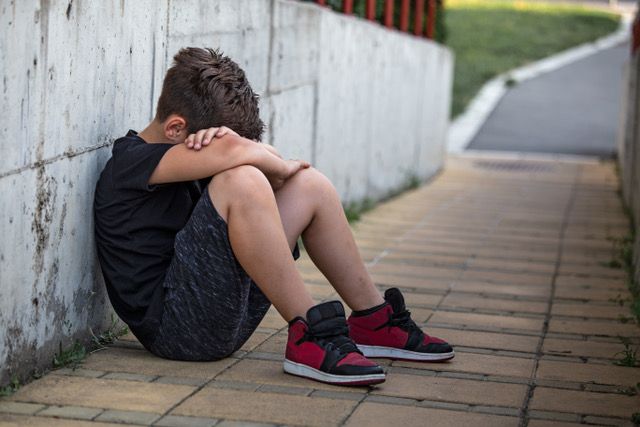Imagine your 8-year-old son is living his best life. He finds humor in everything, makes friends without effort, is carefree, adventurous, easy-going, and absolutely full of joy. One day, things start to change rapidly. His carefree nature turns into incessant worry about things you never imagined he would care about. He appears locked in with obsessive thoughts and rituals. He starts being picky about food, and he has anger and rage episodes. He develops severe separation anxiety and no longer wants to sleep alone in his bed. He regresses so much that he wets the bed. It was going so well for your child just a few weeks ago, and today, you're shocked, scrambling for answers on who (or what) kidnapped your child.
Your first stop might be to your pediatrician, who examines your child and reassures you that there is “nothing wrong”. Despite the reassurance, your parent-gut is screaming to you, “something is very wrong”! You wait a few days but the behaviors continue to worsen, so you return in desperation. The pediatrician once again looks over your son and claims that nothing is physically wrong with him. The pediatrician refers you to a psychiatrist because it is clear your son has developed OCD, anxiety, and likely an eating disorder. There is no history of trauma, no recent changes to his happy life that was abundantly full of joy, and yet your son has developed psychiatric problems.
This is the story of so many families that I have treated over the last several years. It can take a family 6 or 7 doctor visits to find someone who gives the correct diagnosis. Yes, lots of psychiatric symptoms are clearly evident in the child we described, but no, the origin is not elusive. Their symptoms have a physiological basis, their immune system is on fire, and the smoke (instead of it being fever, cough, rash, etc) is all of the behaviors that developed overnight. Pediatricians and providers are becoming better at recognizing autoimmune encephalitis (inflammation of the brain) in children with a similar history to the boy I just described. However, 10 years ago, parents were often dismissed and then referred for psychiatric medications if this happened to their child. Instead of the pediatrician examining the child at that visit, they should have, at a minimum, swabbed their throat for strep, and more ideally, started a thorough immune work-up and evaluation.
PANDAs is Pediatric Autoimmune Neuropsychiatric Syndrome related to strep. While strep was the first pathogen identified to cause these symptoms, we now understand it can be triggered by anything that stresses the immune system. Now, it is shortened to PANs- Pediatric Autoimmune Neuropsychiatric Syndrome, and you fill in the blank what that trigger was. When a child develops PANs, their brain is experiencing autoimmune stress, in particular, in the place of their brain where dopamine is most abundant (the basal ganglia). This is where the symptoms come from, inflammation in the brain caused by the immune system misfiring.
Classic PANs/PANDAs symptoms are:
- Obsessive-compulsive behaviors/OCD
- Motor tics
- Restrictive eating
- Anger/rage and/or anxiety, problems with emotional regulation
- Separation anxiety
- Urinary or voiding dysfunction (such as bed wetting and/or urinary frequency)
Classic triggers of PANs/PANDAs are:
- Strep
- Mycoplasma
- Influenza
- COVID
- Epstein Barr Virus
- Lyme or tic-born illnesses
- Toxic molds (Candida and/or mycotoxins)
This lists the most common triggers, but remember, they are not the only triggers. You can imagine how difficult it is to track the exact pathogen when the list is long and ever-growing. In my practice, I certainly do a thorough work up on what I listed, however, I also let the history guide my evaluation. Sometimes we find the source, other times, we have to try empiric courses of medications to support the immune system, shutting down the inflammation process that is affecting the brain. Treatment might consist of antibiotics, antivirals, anti-fungals, anti-parasitics, and/or steroids. To help support their mood during this time, some parents are willing to start SSRI medications such as Prozac right away, others want to try more natural things such as l-theanine and inositol. In more severe cases, a child might need a blood infusion called IVIG, where they receive passive immunoglobulins from an IV infusion over several days. IVIG is very expensive, not often covered by insurance, and does have risks of side effects. My goal with my patients is to always try to get them under control before considering a referral for this therapy.
I am so passionate about functional medicine because it helps us change the immune terrain. If you have a child that has nutrient deficiencies, inflammation in their gut, and a high level of toxicity going into a PANs exposure, they will likely have worse health outcomes. If that same child has optimized immune terrain (a well-balanced diet and reduced total toxic load), then their outcomes are typically more favorable. While our daily choices of eating healthy and living clean might not feel like the return is comparable to the sacrifice we make, the return on investment will come through for those that do the work. The fewer co-morbid conditions someone has when going into an immune challenge, the easier that immune challenge is to resolve. Covid certainly has demonstrated that, and with PANs, the principles are the same.
The sooner you treat a child, the faster you can turn them around. In practice, I have seen children come in with PANs symptoms, we identified strep on his throat culture, and after 1 week of penicillin, almost all of his neuropsychiatric symptoms were gone. I have also had teenagers come to me at 17 years old, 7 years after they developed symptoms, and they never got a proper diagnosis or treatment. Those patients are typically much harder to help resolve their symptoms, and the road is typically longer, with more intervention that is needed to get them well.
If you resonate with the child I first described, and you have experienced an unexpected twist in your child's happiness, don’t forget to think about PANs. The bottom line is, don’t delay recognizing that the immune system could be the driver of neuropsychiatric symptoms. Don’t allow someone to dismiss your gut instinct as a parent that something is wrong, and certainly don’t delay in getting the right treatment.
- Dr. Emily Gutierrez, DNP, C-PNP, IFMCP, PMHS, CCN
Doctor of Nurse Practice, Certified Pediatric Nurse Practitioner, Institute of Functional Medicine Certified Practitioner, Certified Primary Care Mental Health Specialist, and Certified Clinical Nutritionist
Peer Reviewed References:
Calaprice D, Tona J, Murphy TK. Treatment of pediatric acute-onset neuropsychiatric disorder in a large survey population. J Child Adolesc Psychopharmacol. 2018;28(2):92–103.
Cooperstock MS, Swedo SE, Pasternack MS, et al. Clinical management of pediatric acute-onset neuropsychiatric syndrome: part III-treatment and prevention of infections. J Child Adol Psychop. 2017;27:594–606.
Frankovich J, Swedo S, Murphy T, et al. Clinical Management of Pediatric AcuteOnset Neuropsychiatric Syndrome: Part II-Use of Immunomodulatory Therapies. J. Child. Adolesc. Psychopharmacol 27(7), 574-593 (2017).
Frankovich J, Thienemann M, Rana S, et al. Five youth with pediatric acute-onset neuropsychiatric syndrome of differing etiologies. J. Child Adolesc. Psychopharmacol 25(1), 31-37 (2015)
Sigra S, Hesselmark E, Bejerot S. Treatment of PANDAS and PANS: a systematic review. Neurosci Biobehav Rev. 2018;86:51–65.
Thienemann M, Murphy T, Leckman J, Shaw R, Williams K, Kapphahn C, Frankovich J, Geller D, Bernstein G, Chang K, Elia J, and Swedo S. Clinical Management of Pediatric Acute-onset Neuropsychiatric Syndrome: Part I - Psychiatric and Behavioral Interventions. Journal of Child and Adolescent Psychopharmacology, Vol. 27, No. 7, September 2017. ahead of print DOI: 10.1089/cap.2016.0145
Toufexis, M. D., Hommer, R., Gerardi, D. M., Grant, P., Rothschild, L., D’Souza, P., Williams, K., Leckman, J., Swedo, S. E., & Murphy, T. K. (2015). Disordered Eating and Food Restrictions in Children with PANDAS/PANS. Journal of Child and Adolescent Psychopharmacology, 25(1), 48–56. https://doi.org/10.1089/cap.2014.0063
*All content of this article is for informational purposes only. Furthermore, it is not a substitute for professional advice, diagnosis, or treatment. For this reason, always seek the advice of your provider, therapist, or other qualified health professional with any questions or concerns you may have.*

